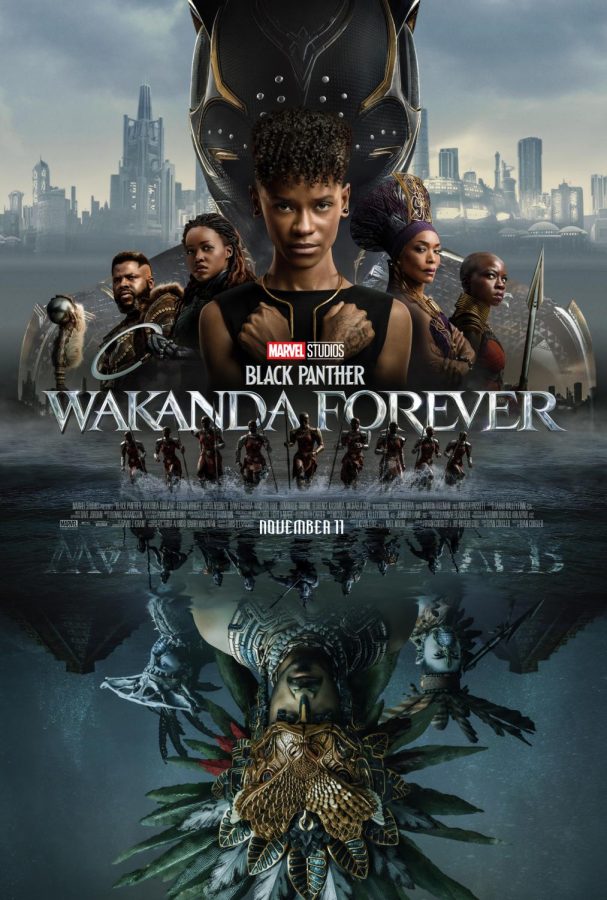“Wakanda Forever” memorializes past heroes and passes the torch to new ones
Used under fair use from Marvel Studios
“Black Panther: Wakanda Forever” releases to critical acclaim, with its cinematography and theme outshining its pitfalls.
December 12, 2022
Four years after the first movie’s release, its sequel, “Black Panther: Wakanda Forever” hits theaters over the Veterans Day weekend. While the movie received lots of publicity and praise for the acting and representation and themes of grief and power, it couldn’t forego the common pitfalls of a Marvel movie, including plot holes, an underdeveloped villain and an excessive final battle. With a much different tone than its predecessor, it is difficult to compare the two movies, even though “Wakanda Forever” shines as one of the best Marvel movies in recent years.
The first Black Panther movie released in 2018 and starred Chadwick Boseman as T’Challa, the King of Wakanda and Black Panther. The first of the Marvel Black Panther series, with a predominantly Black cast and director, many fans and critics find it the best MCU movie, as it was the first superhero movie to be nominated for Best Picture at the Oscars.
After Boseman’s tragic death from colon cancer in 2020, the script of “Wakanda Forever” had to be completely changed. Instead of recasting T’Challa, the movie changed the plot so T’Challa dies off-screen to an unnamed disease. The trailer, which released earlier this year, had one of the biggest public reactions of any Marvel film, creating very high expectations for the sequel, as fans awaited for what was in store with T’Challa’s death. The movie does an excellent job of reflecting the grief the cast and public felt over Boseman’s death through T’Challa’s death, with the pain of loss being one of the strongest motivators for the protagonists. This tone starts with the Marvel Studios intro, composed of pictures of Boseman both as T’Challa and in real life, with silent flashbacks in remembrance for the actor.
Lettia Wright and Angela Bassett star as Shuri and Queen Romanda, and both characters struggle with how to continue their lives after much of the family has died, while also facing potential war with Namor, another nation who threatens Wakanda after a vibranium detector almost discovers their existence. Their mother-daughter relationship, a topic not covered much in Marvel movies, is a central and refreshing part to the storyline, with the Queen trying to give her daughter hope in their traditions, while Shuri is absorbed in her work and technology. Both actresses give amazing performances, as they ambiently display their sadness and anger, increasing the emotional significance for the audience and pushing the themes of technology vs tradition and the dangers of twisted grief becoming revenge. However, for a movie focused on emotions, the ending felt too chaotic with many individual fights during the larger battles, taking away from the main climax between Shuri and Namor.
The visuals and music of the movie further the plot to emphasize the emotions of the characters. While the soundtrack, filled with ballads and rap, is fun, it is the silent moments that have the most power. The silence at the funerals, flashbacks and moments of grief throughout the films powerfully emphasizes the emptiness the deaths cause for the remaining characters, and also for the grieving audience. In scenes of Wakanda especially, shots of contrasting colors and symmetry give the movie better cinematography than other Marvel movies.
The introduction of Namor, one of the most popular anti-heroes from the Marvel comics, was also a watershed moment for Latinx representation in media. Namor’s kingdom is changed from Atlantis to Talokan, a city based on Mesoamerican mythology. Colorism is heavily prevalent when casting Latinx characters, so the inclusion of an Mexican Indigenious city gave many in this community a chance to be seen. Namor, played by Mexican actor Tenoch Huerta, is portrayed as a good king who does everything in his power to protect his kingdom at the expense of the world. However, his motivations to threaten Wakanda feel muddled as the Wakandans do not seem directly involved with the vibranium detector. His personal story of hiding from the atrocities of colonialism and slavery and trying to avenge his people parallels Killmonger from the first movie nicely.
With big shoes to fill, “Wakanda Forever” succeeds in dealing with the emotional significance of the movie and putting minority groups in the limelight. While it failed to meet the huge expectations, Wakanda Forever is an excellent film and a fitting ending to Phase 4 of the MCU.




























































